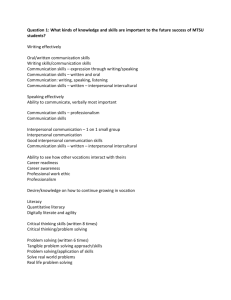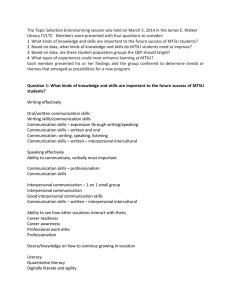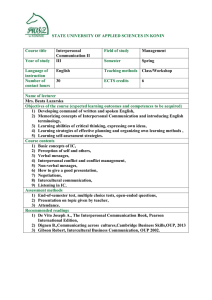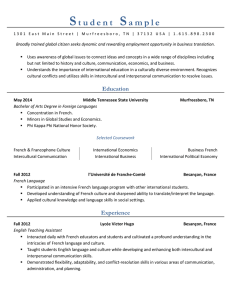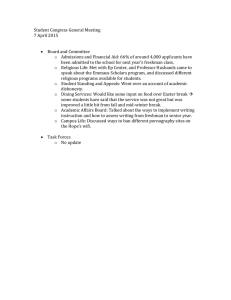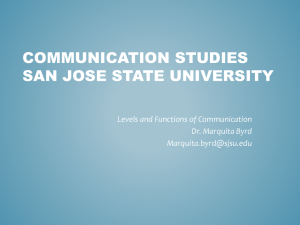Question 1: What kinds of knowledge and skills are important... students? Writing effectively
advertisement
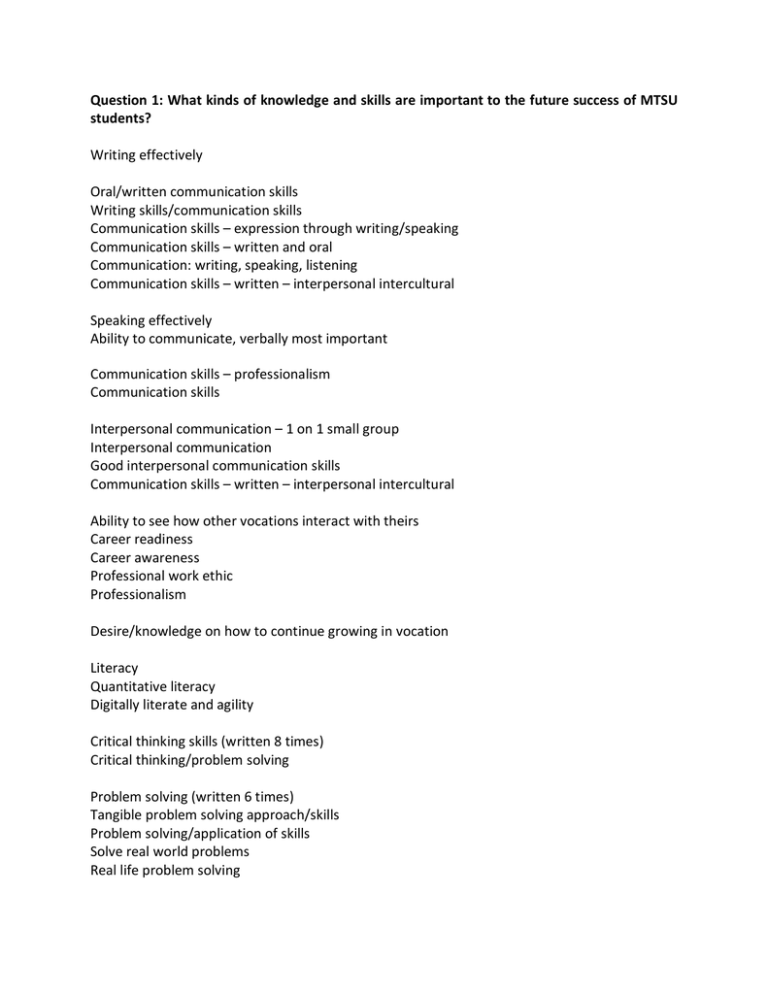
Question 1: What kinds of knowledge and skills are important to the future success of MTSU students? Writing effectively Oral/written communication skills Writing skills/communication skills Communication skills – expression through writing/speaking Communication skills – written and oral Communication: writing, speaking, listening Communication skills – written – interpersonal intercultural Speaking effectively Ability to communicate, verbally most important Communication skills – professionalism Communication skills Interpersonal communication – 1 on 1 small group Interpersonal communication Good interpersonal communication skills Communication skills – written – interpersonal intercultural Ability to see how other vocations interact with theirs Career readiness Career awareness Professional work ethic Professionalism Desire/knowledge on how to continue growing in vocation Literacy Quantitative literacy Digitally literate and agility Critical thinking skills (written 8 times) Critical thinking/problem solving Problem solving (written 6 times) Tangible problem solving approach/skills Problem solving/application of skills Solve real world problems Real life problem solving Decision making Independent learner Resourceful Independence Understanding and appreciation for diversity Global perspective A broader world view Intercultural awareness/diversity Communication skills – intercultural Ability to interact with people who think differently than they do How to work in teams (written 3 times) Social skills – ethics Ability to connect knowledge to applicable real life situations Real world skills/applications of vocation Understanding technology Technology imbedded in subject matter Discipline knowledge Technical/content knowledge Knowledge about differed disciplines and ways of knowing – history, natural sciences, social sciences, etc. Creativity Finding their place in the world Networking Adaptability Question 2: Based on data, what kinds of knowledge and skills do MTSU students need to improve? Writing Writing effectively Writing for understanding vs. creative writing Writing Writing effectively llllll Oral/written communication skills ll Ability to communicate, verbally most important l Interpersonal communication llllll Good interpersonal communication skills lll Workplace communication Learning to give ‘elevator speech’ Professional/Career Readiness llll Professional skills Professionalism – work ethic, diversity, responsibility Professionalism l Literacy llllllll Quantitative literacy Digitally literate and agility ll Critical thinking llllll Problem solving, critical thinking Critical thinking Critical thinking Problem solving ll Tangible problem solving approach/skills lllll Independent learner lllll Resourceful Understanding and appreciation for diversity lll Intercultural awareness/diversity ll Appreciation for diversity How to work in teams l Social skills – ethics ll Connections between knowledge and skills lll Ability to see how other vocations interact with theirs l Basic math – fractions, percentages, geometry Benefits of constructive criticism Technological Time management Health/wellness issues Integration of ideas Question 3: Based on data, are there student population groups the QEP should target? Foreign First Generationllllllllll First Generation Traditional Good students At-risk Allll All Transferl Transfer Freshman Freshman Freshman/sophomores llllllllllll Freshman and sophomores Lower divisionl Lower division Freshman/sophomores Lower division Question 4: What types of experiences could most enhance learning at MTSU? New pedagogical experiences Active learning lll Active learning Active learning (Internships and job shadowing) Problem-based learning l Real world applied learning llll Inquiry based pedagogy Project-Based Learning In-class simulations matched to out of class experiences l EXL at lower levels lll EXL types of experiences l EXL in two connected courses Community-centered experiential Experiential Cross-Campus Service learning llll Service learning Community service University service Internships l Internships Internships Job shadowing/internships Job shadowing l Connection with employers in field l Discipline-specific employer talks to fresh/soph students Learning communities/Linked courses llllllll Learning community Learning communities Learning communities (2 classes) Linked classes Learning communities Community learning Engagement and community (in class and co-curricular clubs) llllll Purposeful engagement Engagement Engagement Culture of engagement Multi-national virtual groups linking global learners ll Peer tutoring (study groups) ll Peer learning Interdisciplinary classes l Co-Curricular l Faculty-student research Undergrad research/creative activity Customer service National Student Exchange Residence halls Gen. Ed. Themes (such as English for business majors) Setting expectations ePortfolios Engaged faculty Study abroad Customs to freshman transition Social media
